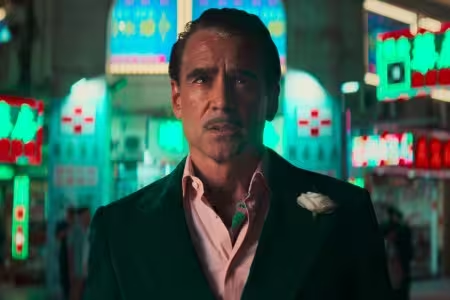8 Minutes
The 21st Zurich Film Festival has arrived with a glossy, international program that blends red-carpet glamour and hard-edged industry debate. Opening night belongs to Michael Angelo Covino’s romantic comedy Splitsville, a crowd-pleasing entry that brings Dakota Johnson back into a lighter, sharply observed register. Johnson will also accept the festival’s Golden Eye career award — a reminder that ZFF has become as much a place for honoring film talent as for discovering films.
Gala premieres and a lineup built for awards season
Zurich’s Gala Premieres section reads like a who’s who of contemporary cinema: Luca Guadagnino’s After the Hunt with Julia Roberts; Benny Safdie’s Dwayne Johnson–led The Smashing Machine; Edward Berger’s gambler drama Ballad of a Small Player, featuring Colin Farrell; Yorgos Lanthimos’ Bugonia with Emma Stone; and James Vanderbilt’s Nuremberg starring Russell Crowe. Several of these titles are already generating awards buzz, and the festival’s timing—just after Toronto and before the awards ramp-up—positions ZFF as a strategic stop for films seeking European premieres and last-minute momentum.
Splitsville itself sits slightly outside the heavier, prestige end of the program. Covino, whose earlier work drew attention for its fresh takes on relationship dynamics, steers this film toward the romantic-comedy tradition while injecting modern anxieties about dating and commitment. For viewers, it’s useful to compare Splitsville to recent genre reinventions: think the emotional honesty of recent rom-coms like To All the Boys I’ve Loved Before mixed with the sharper comic beats found in indie hits by directors such as Nora Ephron’s spiritual heirs. Dakota Johnson’s presence — and her Golden Eye tribute — brings attention to an actor who has quietly diversified her career beyond franchise fare.
New: Film Finance Forum — Swiss capital meets Hollywood
This year ZFF introduces a Film Finance Forum, a deliberately pragmatic addition that pairs international producers with Swiss private banks and wealth managers. Zurich’s role as a global wealth hub makes the move logical: festival director Christian Jungen has emphasized that many producers are seeking “serious, boring money with no strings attached” — a contrast to the volatile, highly conditional financing models increasingly common in the streaming era.
The Forum invites around 30 Swiss financiers to meet U.S. and other international producers, creating a matchmaking environment that could accelerate deals for mid-budget features and auteur projects. For independent filmmakers, this is a tangible opportunity: European private capital has historically underwritten arthouse cinema, and with studios consolidating and streamers tightening acquisition strategies, private investors are re-emerging as important backers for films that might not fit the mainstream market.
Zurich Summit: debates on AI, politics and the future of festivals
The Zurich Summit will be a centerpiece for the festival’s industry conversation, tackling everything from festival relevance to geopolitical pressures and the fast-evolving role of technology in film. Speakers include festival heads and distribution leaders—Cameron Bailey, Tricia Tuttle, Helen Hoehne—and execs from Sony Pictures Classics, 30West, CAA Media Finance and other heavy-hitters. Neon’s Tom Quinn receives the Game Changer Award, a fitting nod to the distributor’s recent track record of both auteur-driven hits and box-office reach.
Panels will examine how awards shows and festivals maintain clout, whether international production incentives are reshaping screenplay choices, and which release strategies still work for indie films. Of particular interest are sessions on political turmoil and on AI’s growing influence: both topics feel urgent. Junge notes the festival will host YouTubers and young AI founders alongside established studio players to discuss how creators and technologists are changing storytelling tools and distribution paths.
AI onstage: spectacle and concern
An on-site AI presentation promises to be "stunning," Jungen says — a sign that Zurich wants to be a forum where the industry can see new technology demonstrated, not just debated. This is no mere tech show: AI’s effect on casting, previsualization, localization, and even screenplay generation is already real, and festivals are wrestling with how to regulate credit, preserve authorship, and protect jobs. Expect informed optimism and guarded skepticism in equal measure.

Awards, tributes and the human stories
ZFF’s award slate is equally eclectic. Besides Dakota Johnson, winners include Colin Farrell (Golden Icon) and Russell Crowe (Lifetime Achievement). Benedict Cumberbatch and Wagner Moura are also being honored as part of a program that recognizes both mainstream visibility and art-house credentials. Films competing for the Golden Eye in Feature Film Competition range from intimate dramas like James Sweeney’s Twinless to Kaouther Ben Hania’s The Voice of Hind Rajab, which addresses devastating real-world events in Gaza—ZFF’s Border Lines strand continues to foreground human-rights cinema.
The presence of filmmakers such as Kleber Mendonça Filho, and the premiere of George Clooney-fronted Jay Kelly (with Noah Baumbach receiving a tribute) underline Zurich’s ambition to balance industry heft with cultural relevance.
Context and critical perspective
Zurich’s growth is part of a broader trend: regional festivals are carving niche identities as alternative marketplaces to Cannes and Venice, and as clarifying waypoints after Toronto’s premiere wave. ZFF’s recent management buyout from a major media group signals a new, entrepreneurial chapter: the festival is openly courting studios, streamers, and private investors as partners for awards-season positioning. That strategy has both benefits and risks: by becoming a landing zone for high-profile American films, Zurich boosts its profile but also competes for attention with established European festivals.
There’s also the question of distribution for politically charged films. Junge’s remarks about titles that struggle to find U.S. distribution highlight a systemic problem: films that critique powerful institutions or depict controversial topics can be sidelined by distributors wary of backlash or losing market access. This year’s programming and summit panels aim to grapple with whether the festival circuit can still champion critical cinema in a polarized global marketplace.
Comparisons and fan notes
Comparisons are inevitable: ZFF’s rise reflects strategies employed by other mid-sized festivals like Telluride and San Sebastián, which have become critical springboards for award contenders. Neon’s catalog draws a useful parallel with A24-era curatorial risk-taking: both distributors take chances on auteur cinema with an eye toward building long-tail audiences. Fan communities are already buzzing about the attendance of household names and the potential for surprise premieres; social feeds suggest that the festival’s mix of prestige and accessibility resonates with both cinephiles and industry professionals.
“Zurich is increasingly important for filmmakers and distributors who want a European launch pad that respects both the art and the market,” says film critic Anna Kovacs. “The Film Finance Forum is a smart, timely addition: it bridges the finance world and creative producers in a way many festivals haven’t managed yet.”

What to watch and why it matters
Keep an eye on Ballad of a Small Player and Nuremberg for awards trajectory; check Border Lines for politically urgent storytelling; and see Splitsville and other Gala Premieres if you want to assess how star-powered films are being positioned for both commercial and critical success. The Film Finance Forum could be the sleeper story: if private Swiss investment begins to underwrite mid-budget auteur films, that shift will have ripple effects across European co-productions and indie financing models.
Zurich’s atmosphere — described by Junge as "easygoing" — remains one of the festival’s unique selling points. That relaxed cadence allows for longer conversations, thoughtful panels, and deal-making that doesn’t feel rushed. In a year where technology, politics, and finance collide in unpredictable ways, ZFF is positioning itself as a thoughtful crossroads: part celebration, part policy lab, and increasingly, a practical marketplace for film financing.
Whether you’re a cinephile drawn to premieres or a producer hunting for capital, this iteration of the Zurich Film Festival promises both spectacle and substance. The real test will be how many of these films and financing conversations translate into sustainable distribution deals and lasting artistic impact — and whether Zurich’s new industry initiatives alter the balance for indie cinema in the seasons to come.
Source: variety


Leave a Comment